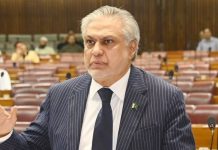WASHINGTON: The United States will continue to work with the present government in Pakistan as it did with previous rulers, says Congressman Brad Sherman, the expected chairman of the House Foreign Affairs Committee.
Talking to journalists discussion on “Pakistan after the elections”, Mr Sherman dispelled an impression that the United States was supporting the forces that opposed Pakistan’s territorial integrity.
“We work with an awful lot of governments around the world. As a country, we have to deal with governments as they exist,” said Mr Sherman when asked if the Trump administration would work with the present Pakistani government for promoting better relations between the two countries. “And, of course, we had dealt with military governments in Pakistan that had no claim to democratic legitimacy,” he added. “The power structure that currently exists in Islamabad is not the most military power structure that we have done business with Pakistan.”

At a conference organised by a group called South Asians Against Terrorism and for Human Rights, speakers expressed concern over an alleged drift in Pakistan towards authoritarianism. They warned that weakening the country’s civilian institutions could have disastrous consequences for the entire nation.
Responding to the allegation that the United States was supporting secessionist forces in Pakistan, Congressman Sherman said that governments had a natural tendency to support the territorial integrity of other governments. “Nothing that I see involving the Pakistani government would cause the US to support a change in its territorial integrity,” he added.
In his keynote address to the conference, Mr Sherman expressed concern over the fairness of the last electoral process in Pakistan. He also stressed the US demand for the release of Dr Shakil Afridi who helped lead US forces to a compound in Abbottabad where Osama bin Laden was hiding. “US chose to ignore that OBL was living close to Pakistani military academy but can’t ignore that the man who helped find Osama is behind bars,” Mr Sherman said.
“You can do a five-hour meeting at the State Department, never hearing about Afridi. But you cannot do a one-hour hearing at the foreign affairs committee … without hearing about Dr Afridi,” he said. “Whatever can be done within reason to bring Afridi and his family here in the United States is critical for the US-Pakistani relationship.”
Responding to another question, he acknowledged the importance of the Kashmir issue. “Whenever there is an incident in Kashmir, this feeds into divisions between India and Pakistan,” he said. “And obviously, the calmer Kashmir can be, the more every group in Kashmir can be at peace, the more peaceful the world will be.”
Asked if the PTI government could help improve US-Pakistan relations, Mr Sherman noted Prime Minister Imran Khan came from outside the political party structure and there’s pressure on him to produce results.
“I think a good relationship with the US and the very things that the US is pushing for, will help the Pakistani people,” said the California Democrat who is likely to head the House Foreign Affairs Committee where Democrats now have a clear majority.
Asked what the US was pushing for in a new relationship with Pakistan, Mr Sherman said education was the first priority and then came dealing with the groups that had caused Pakistan both domestic and external problems.



